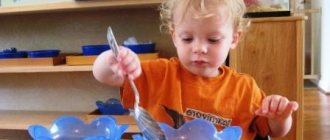Hyperactivity concept
Hyperactivity is a condition in which a person is overly active and energetic, but at the same time inattentive. Most often it is characteristic of children. It is difficult for a hyperactive child to concentrate on one thing and maintain attention. He quickly moves from one action to another, and is often impulsive and restless. He may have problems communicating with both adults and other children. He wants to be everywhere and everywhere. It is difficult to calm a hyperactive child and force him to do one thing.
Causes of hyperactivity
A child’s hyperactivity is not associated with physiological abnormalities, but with a behavioral developmental disorder. In medicine, this condition is called attention deficit hyperactivity disorder. Currently, scientists believe that the causes of child hyperactivity are associated with abnormal development in the womb and/or difficult childbirth. If the mother had long-term toxicosis or the fetus was diagnosed with intrauterine asphyxia, then the chances of having a hyperactive baby triple. Also, any operation during pregnancy and the baby’s stay in the hospital contribute to the appearance of hyperactivity.
In addition, hyperactivity can occur due to:
- Hypoxia (oxygen starvation of organs and tissues).
- Maternal smoking during pregnancy.
- Poor nutrition during pregnancy.
- Frequent stressful situations.
- Delivery before 38 weeks.
- Prolonged period of contractions.
Tip two: move more.
A hyperactive child definitely needs to throw out his energy. Create suitable conditions for this:
- Walking in the fresh air is a must. But don’t try to force your treasure to walk gracefully “hand in hand” in new white trousers. Let him run, jump, climb and slide down the slides. Remember the yard games from your childhood - and you will be pleased to plunge into the past, and the child will be happy to play together.
- The sports section is a very good way out. It’s good for your health, good for your psyche, and good for developing the habit of obeying your elders and doing the exercises in the correct sequence. Be sure to take into account the interests and capabilities of the child. If he is “not doing well at all” or his behavior is causing conflicts with the coach, it may be worth looking for another activity. Very often, the fact that in some type of activity the ADHD person is “on horseback” stimulates him to behave more restrained.
- It’s also a good idea to organize small exercise sessions at home. Especially if you are doing some kind of educational activities or doing school homework. Perseverance is not your child’s strong point, so you shouldn’t force him to pore over books for a long time. Once you've worked out, come up with some kind of game to relieve stress.
- Buy a home gym. On it, the child will not only be able to express his activity, but also become more dexterous, which will allow him to protect himself from possible injuries due to his restlessness.
Symptoms of hyperactivity
To distinguish a typical active and energetic baby from a child with attention deficit hyperactivity disorder, several factors need to be taken into account. Signs of hyperactivity in children can appear as early as 2-3 years. Therefore, the diagnosis can be determined in kindergarten, when the child begins to communicate with peers and teachers. To understand whether your baby suffers from this disease or not, you need to get acquainted with the characteristics of hyperactive children:
- Excitement and anxiety for no apparent reason.
- Mood swings, constant tears, sensitivity, excessive sensitivity.
- Sleep problems.
- Complication of speech.
- Communication problems.
- Absolute disobedience.
- Aggressive behavior.
In families, the question often arises of what parents with hyperactive children should do. If your baby has some of these symptoms, you should see a doctor. He will instruct you on what to do, what medications to take, and how to calm your child.
Hyperactive child - Komarovsky
Dr. Komarovsky argues that parents should receive information from doctors on how to act in a given situation, learn correctly, and treat such children. It’s great if grandparents help moms and dads in raising a restless child. After all, it wouldn’t hurt for parents to take a break from time to time either. As a rule, the disease of lack of attention and hypermobility disappears during adolescence.
How to raise a hyperactive child?
Most parents have no idea how to raise a hyperactive child. Big problems begin when the child encounters a new team - he goes to kindergarten or school. Such children always have special treatment from teachers and psychologists. The most important thing that parents should remember is that only they can help their child. Therefore, it is important to stock up on patience, wisdom, and willpower. You cannot make scandals, swear or use physical violence. This will only make the situation worse. The child will become more withdrawn and uncontrollable. Only if the child has committed an offense that has greatly harmed other people can these methods be used.
How to raise a hyperactive child:
- Prohibitions must be formulated correctly. Your phrases should not contain the words “no” and “cannot”. It’s better to say: “Let’s go and have tea and sweets together” than “You can’t run in the rain.” Your prohibitions must be motivated and justified. For example, if a child wants to go out for a walk in the evening, but it’s already late, tell him that you wanted to read him an interesting fairy tale before bed. And if you stay any longer, you won’t have time to do it.
- Setting objectives should be clear and precise. Hyperactive children absorb information worse, so speak briefly and monosyllabically.
- A hyperactive child does not multitask well. Don't say, "Get the dishes from the living room, put them in the sink, wash your hands, and then go eat dinner." It is better to maintain consistency and give tasks in order.
- Maintain control over time. Hyperactive children easily get carried away and forget about other things. Therefore it is necessary to control them.
- It is necessary to create a daily routine. If a child has a schedule of activities hanging in his room, he will learn accuracy and punctuality. It will also calm him down and teach him order.
- Bring positivity into your child's life. Praise him for good grades and help around the house. Teach him to notice beauty in details. Communicate with him on a positive note. Create a great mood for him. Smooth out arguments and reward good behavior.
- Help your child find a hobby. This could be sports clubs, cycling, reading books, playing in a theater studio or playing a musical instrument, clay modeling, birch bark weaving. The child must know where to throw out his energy. And it will be better if he pours it out into a positive, exciting activity than into computer games.
- If necessary, give your baby a homeopathic remedy. But don't overdo it with sedatives. And in any case, you should first consult a neurologist and psychologist.
Interaction with a hyperactive child
In order to have some order, you need to accustom your baby to a clear daily routine. He must know exactly when to stay awake, when to eat and what time to go to bed. Of course, you won’t be able to do this in one or two days, but if you persistently, without shouting, with little tricks, teach your little one the established rules, then it will be much easier for both you and your child in the future morally.
The days need to be a little similar. For example, in the morning the baby woke up, washed his face, brushed his teeth, had breakfast, and the active phase began. Then after a while - a small lesson, lunch. Then a walk on the street, afternoon tea, reading a book, games, dinner in the evening, chatting with dad, who came home from work. Exactly at nine in the evening, mom spreads out the bed, turns on her favorite night light, and after the water procedures the baby lies down in the pastel. Mom is reading her favorite book.
IMPORTANT: Excessive gentleness of parents in raising fidgets is not welcome. Make sure your child does not get overtired.
Sports for a hyperactive child
How to help your child cope with hyperactivity? Many parents try to enroll their baby in various sections and clubs so that by the end of the day he will get tired and fall asleep peacefully. However, a hyperactive child does not become calmer. What to do? Sign up for the pool!
The space in the pool is organized in such a way that a child, swimming on the path, has virtually no contact with other children. This helps you focus on yourself and your own achievements. Self-defense classes, which by default foster a defensive reaction, and group sports only aggravate hyperactivity. Swimming promotes relaxation and calms the nervous system; staying in the water promotes inner harmony.
According to pediatricians, the peak of hyperactivity occurs at 4-5 years and at 7-9. This age is the most suitable to start swimming pool lessons. Doctors do not recommend sending a child to the section before 5 years of age. Sports will help your child learn to concentrate and develop self-confidence.
Scientists conducted a study and concluded that children who go in for swimming have more developed resourcefulness and ingenuity compared to their peers who are passionate about other sports.
Swimming in sports sections fosters self-discipline. Working for time and for results, the child learns the correct routine, the ability to set goals and achieve what he wants from a young age.
In hyperactive children, experts observe increased emotionality and anxiety. Water has a calming effect; the child is emotionally relieved in the pool. Physical activity in water releases excess energy. After training, the child feels a pleasant feeling of fatigue.
If parents have the opportunity, it is better to organize individual lessons. The competitive spirit inherent in sports such as basketball, dancing and even chess is of no use to a hyperactive child. This will further upset the unstable emotional background.
Training in the pool strengthens the immune system. Only swimming, as a sport, keeps the entire muscular system in good shape: posture is strengthened, arms and shoulders become strong. Exercising in water normalizes blood circulation and improves the general condition of the body. The pool prevents diseases such as acute respiratory viral infections, scoliosis, and problems with the skeletal system.
Before signing up your child for swimming, read the reviews about the sports facility, interest your child, and list all the advantages that he will gain as a result of swimming in the pool.
Hyperactive child: what should parents do? Advice from a psychologist
To gradually cope with your child's hyperactivity, put into practice the following advice from specialist psychologists:
- TIP : Do not give the student several tasks at once. Let him handle one simple job first, then move on to the next one.
- ADVICE : Do not set goals for your fidget for the distant future, he will forget about them anyway. For example, if you clean your room for a whole month, then your dad and I will give you a new bicycle. Better say that if you put the toys away now, I’ll let you play on the computer
- TIP : For every task well completed, give your child a reward (a token). For example, if you collect twenty tokens, we will give you a puppy
- TIP : If you are going to the clinic tomorrow, then today think about what you can do there while waiting in line to see the doctor
- TIP : Try to teach your child to sense time. To do this, when performing any task, use an hourglass or a timer. In the future, thanks to this, the baby will not put off important things until later.
Games for hyperactive children
- "Magic Ball" When the child is most energetic, excited and cannot calm down, give him a thread of yarn and ask him to wind it into a ball. At the same time, tell him that this ball is not simple, but magical. The longer you reel it in, the faster you calm down. Your baby will gradually get used to this process and, when he feels that he has become too wound up, he will ask for the magic ball.
- “We find something new.” Any geometric figure is drawn on paper with a felt-tip pen or on a blackboard with chalk. Family members or friends of the child close their eyes, and one of them draws something of his own to the figure. Then everyone opens their eyes and finds changes, and so on in turn. This game develops concentration.
- "Fishing". The participants of the game stand in a circle, pressing their legs and arms tightly against each other. The driver, the “fish,” stands in the center of the circle and tries to get out of it. The task of those standing in the ring is not to let the fish out of the net. This game improves reaction speed and develops coordination of movements.
- "Archaeological excavations". An adult puts his hands in the sand or cereal. The child’s task is to dig out the adult’s hands without touching them with his fingers. This game develops muscle control.
- "We listen to silence." At the first clap of his hands, the child begins to run around the apartment, make noise, and sing. At the sound of the second claps, he quickly sits down on a chair and listens to what is happening in the apartment or on the street. And then he tells what he heard. It could be the beating of your heart, the noise of cars outside the window, the whistling of the kettle in the kitchen. The game develops children's attention and self-control.
- "Bell". Children sit in a circle. The driver is blindfolded, and the other children are given a bell, which they pass around in a circle. The driver's task is to catch the person with the bell. The game promotes hearing development.
Effective therapy
Treatment of hyperactivity in children should be carried out comprehensively. Experts may advise the use of psychological and pedagogical correction, psychotherapy, and the use of special medications.
If a hyperactive child is studying at school, then he needs to select an individual regime. His class should be small, lessons should be shortened, assignments should be given in doses. How to calm a hyperactive child? Correcting the disease may mean maintaining sufficient physical activity, adequate sleep, and proper nutrition. The child should walk a lot in the fresh air. Due to the syndrome, it is better for the child to be in noisy children's company less often. His presence at large, public events is limited.
How to treat deviation? In addition to conversations and games, you can use drug treatment. To cure the child, he is prescribed atomoxetine hydrochloride, medications that are part of the nootropic group. These are Cortexin, Pyritinol, Phenibut, etc. They produce a sedative effect.
How to communicate with a hyperactive child? If there are speech disorders, then classes are conducted with a speech therapist. Achieving a good effect is possible through massage of the cervical spine and the use of kinesiotherapy.
Nowadays there are a lot of children diagnosed with childhood hyperactivity. They find it difficult to study, observe, and even communicate with teachers. But these are still the same children, to whom you just need to find the right approach. It is the parents who must do this, because over time the child will realize his problems and begin to independently change his life. The sooner his family helps him with this, the easier and faster he will be able to adapt to this life.
Tags:Hyperactivity
We also recommend reading on this topic:
- Possible consequences of punishing children with a belt
- The process of education: if a child steals from a store
- Useful games for hyperactive children
- Who is an aggressive child and how to rehabilitate him?
One answer
- Karina I’m surprised when mothers simply wait out the child’s adaptation to kindergarten, it’s a huge stress. If you are afraid to give pills, you can give them soft drinks. “Hare” syrup helped my daughter without any negative consequences. It is a dietary supplement specifically for children and is much gentler than tablets. There is nothing harmful in the composition. Herbal extracts specifically for relieving anxiety and relaxation, magnesium for the nervous system.
Answer










